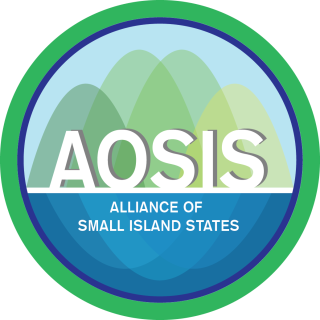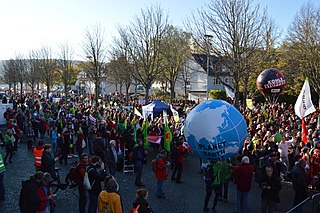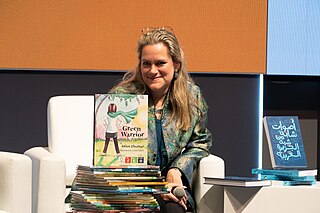Global governance refers to institutions that coordinate the behavior of transnational actors, facilitate cooperation, resolve disputes, and alleviate collective action problems. Global governance broadly entails making, monitoring, and enforcing rules. Within global governance, a variety of types of actors – not just states – exercise power. Governance is thus broader than government.

Alliance of Small Island States (AOSIS) is an intergovernmental organization of low-lying coastal and small island countries. AOSIS was established in 1990, ahead of the Second World Climate Conference. The main purpose of the alliance is to consolidate the voices of Small Island Developing States (SIDS) to address global warming.

Peace Boat is a global non-government organization headquartered in Japan established for the purpose of raising awareness and building connections internationally among groups that work for peace, human rights, environmental protection and sustainable development. "Peace Boat" may also refer to one of the ships embarking on a cruise under the Peace Boat organization. Since its founding in 1983, the Shinjuku, Tokyo based organization has launched more than 100 voyages. These cruises, the main operation of the Peace Boat organization, are on average carried out at least three times a year. Peace Boat, described by the San Francisco Chronicle as a "floating university of sorts", offers educational opportunities aboard, with conferences related to global events. They also provide humanitarian aid at their various stops and visit local organizations.
The UK Youth Climate Coalition (UKYCC) is a non-profit youth organisation in the United Kingdom. It is part of The Climate Coalition in the UK
In political ecology and environmental policy, climate governance is the diplomacy, mechanisms and response measures "aimed at steering social systems towards preventing, mitigating or adapting to the risks posed by climate change". A definitive interpretation is complicated by the wide range of political and social science traditions that are engaged in conceiving and analysing climate governance at different levels and across different arenas. In academia, climate governance has become the concern of geographers, anthropologists, economists and business studies scholars.

The International Day of Forests was established on the 21st day of March, by resolution of the United Nations General Assembly on November 28, 2013. Each year, various events celebrate and raise awareness of the importance of all types of forests, and trees outside forests, for the benefit of current and future generations. Countries are encouraged to undertake efforts to organize local, national, and international activities involving forests and trees, such as tree planting campaigns, on International Day of Forests. The Secretariat of the United Nations Forum on Forests, in collaboration with the Food and Agriculture Organization, facilitates the implementation of such events in collaboration with governments, the Collaborative Partnership on Forests, and international, regional and subregional organizations. International Day of Forests was observed for the first time on March 21, 2013.

Climate finance are funding processes for investments related to climate change mitigation and adaptation. The term has been used in a narrower sense to refer to transfers of public resources from developed to developing countries, in light of their UN Climate Convention obligations to provide "new and additional financial resources". In a wider sense, the term refers to all financial flows relating to climate change mitigation and adaptation.

The United Nations Climate Change Conferences are yearly conferences held in the framework of the United Nations Framework Convention on Climate Change (UNFCCC). They serve as the formal meeting of the UNFCCC parties – the Conference of the Parties (COP) – to assess progress in dealing with climate change, and beginning in the mid-1990s, to negotiate the Kyoto Protocol to establish legally binding obligations for developed countries to reduce their greenhouse gas emissions. Starting in 2005 the conferences have also served as the "Conference of the Parties Serving as the Meeting of Parties to the Kyoto Protocol" (CMP); also parties to the convention that are not parties to the protocol can participate in protocol-related meetings as observers. From 2011 to 2015 the meetings were used to negotiate the Paris Agreement as part of the Durban platform, which created a general path towards climate action. Any final text of a COP must be agreed by consensus.

The 2015 United Nations Climate Change Conference, COP 21 or CMP 11 was held in Paris, France, from 30 November to 12 December 2015. It was the 21st yearly session of the Conference of the Parties (COP) to the 1992 United Nations Framework Convention on Climate Change (UNFCCC) and the 11th session of the Meeting of the Parties (CMP) to the 1997 Kyoto Protocol.

The 2016 United Nations Climate Change Conference was an international meeting of political leaders and activists to discuss environmental issues. It was held in Marrakech, Morocco, on 7–18 November 2016. The conference incorporated the twenty-second Conference of the Parties (COP22), the twelfth meeting of the parties to the Kyoto Protocol (CMP12), and the first meeting of the parties to the Paris Agreement (CMA1). The purpose of the conference was to discuss and implement plans about combatting climate change and to "[demonstrate] to the world that the implementation of the Paris Agreement is underway". Participants work together to come up with global solutions to climate change.

The Global Landscapes Forum (GLF) is a multi-stakeholder forum that facilitates participation in landscape approaches.

The 2017 United Nations Climate Change Conference (COP23) was an international meeting of political leaders, non-state actors and activists to discuss environmental issues. It was held at UN Campus in Bonn, Germany, during 6–17 November 2017. The conference incorporated the 23rd Conference of the Parties to the United Nations Framework Convention on Climate Change (UNFCCC), the thirteenth meeting of the parties for the Kyoto Protocol (CMP13), and the second session of the first meeting of the parties for the Paris Agreement.
Article 6 of the Paris Agreement on climate change enables Parties to cooperate in implementing their nationally determined contributions (NDCs). Among other things, this means that emission reductions can be transferred between countries and counted towards NDCs. Agreement on the provisions of Article 6 was reached after intensive negotiations lasting several years.
The 2018 United Nations Climate Change Conference, more commonly referred to as the Katowice Climate Change Conference or COP24, was the 24th Conference of the Parties to the United Nations Framework Convention on Climate Change. It was held between 2 and 15 December 2018 in Katowice, Poland. The conference was held in the International Congress Centre. The president of COP24 was Michał Kurtyka. The conference also incorporated the fourteenth meeting of the parties for the Kyoto Protocol (CMP14), and the third session of the first meeting of the parties for the Paris Agreement which agreed on rules to implement the Agreement. The conference's objective was to have a full implementation of the Paris agreement.

Marie-Claire Cordonier Segger is a full professor, senior executive, an international expert in policy, law and governance on climate change, biodiversity, human rights, trade, investment and financial law and the world's Sustainable Development Goals. She currently serves as Leverhulme Trust Visiting Professor at the University of Cambridge, UK; executive secretary of the global Climate Law and Governance Initiative (CLGI) and senior director of the Centre for International Sustainable Development Law (CISDL). She is also a Fellow in Law & LLM/MCL Director of Studies at the Lucy Cavendish College; fellow at the Lauterpacht Centre for International Law; visiting fellow at the Bennett Institute for Public Policy and Fellow at the Cambridge Centre for Energy, Environment & Natural Resource Governance. Further, she is full professor at the University of Waterloo School of Environment, Enterprise and Development in Waterloo, Ontario, Canada, where she is also senior fellow at the Balsillie School of International Affairs (BSIA) and senior advisor to the Interdisciplinary Centre on Climate Change (IC3). She serves as chair of the Convention on Biological Diversity (CBD) Biodiversity Law & Governance Initiative; rapporteur for the International Law Association Committee on Sustainable Natural Resources Management; co-founder member of the board of the Sustainable Development Solutions Network (SDSN) of Canada; member of the International Law Association (ILA) Board of Canada; co-founder and councillor of the World Future Council.

Ayman Cherkaoui is an international jurist in climate change law, Executive Director of the United Nations Global Compact in Morocco, and Lead Counsel for Climate Change at the Centre for International Sustainable Development Law in Montreal Quebec, Canada. Cherkaoui in 2017 was named to the Emerging Leaders Program at the Policy Centre for the New South, and in 2018 was named to the Obama Foundation Leaders: Africa Program.

Neeshad V. Shafi is a Qatar-based climate advocate and environmental activist. He is the co-founder of the Arab Youth Climate Movement Qatar, a movement working on creating climate change awareness and policies in Qatar. Neeshad's work includes mainstreaming climate change issues, youth advocacy and grassroots work in Qatar. He is currently the executive director at the Arab Youth Climate Movement Qatar and also a Non-Resident Fellow at Middle East Institute (MEI).

Joshua Amponsem is a Ghanaian climate advocate and a co-founder of Green Africa Youth Organization (GAYO). He is the climate specialist at the Office of the UN Secretary General's Envoy on Youth. He is the Lead Author of Adapt for Our Future, the first-ever research paper on the role of youth in advancing climate adaptation. His career has been more focused on grassroots climate and waste management solutions while advancing youth engagement in resilience building, disaster risk reduction, and climate change adaptation at the international level.
Koko Warner is a climate change expert who specializes in human migration and displacement and who holds a PhD in economics from the University of Vienna. In 2014, the International Council for Science named Warner as one of the top 20 women making contributions to climate change debate.












